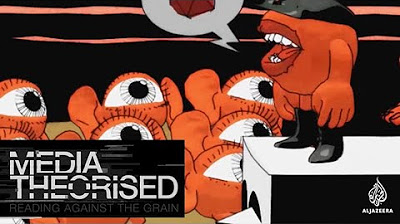Detachment, Objectivity, Imagination: A Critique
Summary
TLDRThis video script explores the concept of detachment in historical and scientific narratives, challenging the idea of objectivity. It discusses how historians and scientists, despite aiming for rationality and fact-based analysis, are inevitably influenced by personal biases and the need to create compelling narratives. The script also touches on the Romantic movement's emphasis on the imagination and personal perspective, suggesting that a complete understanding of history requires acknowledging the emotional and imaginative aspects of human experience.
Takeaways
- 📚 Kingsley Amis' novel 'Lucky Jim' satirizes the dry and mindless approach to historical facts, emphasizing the need for a more engaging and humanized perspective.
- 🏰 Walter Scott's 'Ivanhoe' is noted for its dedication to the Reverend Dr. Dryasdust, highlighting the historical tendency to present facts devoid of narrative interest.
- 📈 Charles Dickens in 'Hard Times' criticizes the Victorian era's overemphasis on facts, advocating for a balance between facts and imagination in education.
- 🔍 The scientific method values objectivity and detachment, but postmodern theory challenges the feasibility of complete detachment in the collection and interpretation of facts.
- 📖 Historians are tasked with transforming raw data into narratives, a process that inherently involves subjective choices and imaginative constructions.
- 🎭 Haydon White argues that historians' personal preferences influence the selection and presentation of historical facts, shaping the narrative.
- 📝 Beverly Southgate extends White's argument, suggesting that historians' choices are as much a part of the narrative as the empirical sources themselves.
- 🌟 Romanticism emphasizes the importance of the imagination in historical interpretation, valuing personal and emotional connections to the past.
- 🖋️ The works of historians like Jules Michelet and Thomas Carlyle blend fact with feeling, aiming to engage readers' emotions and moral imaginations.
- 💡 The script suggests that a romantic approach to history acknowledges the role of the historian's emotions and imagination in the creation of historical narratives.
- 🌐 The video concludes by advocating for a holistic view of history that includes both empirical facts and the subjective experiences of the historian.
Q & A
What is the title of Kingsley Amis' 1954 novel?
-Kingsley Amis' 1954 novel is titled 'Lucky Jim'.
Who is the protagonist of 'Lucky Jim' and what is his profession?
-The protagonist of 'Lucky Jim' is Jim Dixon, who is a historian.
What is the subject of Jim Dixon's published essay in the novel?
-Jim Dixon's published essay is about 'the economic influence of the developments in shipbuilding techniques, 1485'.
How does Amis describe the title of Dixon's essay in 'Lucky Jim'?
-Amis describes the title as 'perfect' because it encapsulates the 'niggling mindlessness' and the 'funeral parade of yawning enforcing facts'.
What is the satirical point about the Victorian emphasis on facts in 'Hard Times' by Dickens?
-In 'Hard Times', Dickens satirizes the Victorian focus on facts by portraying the teacher Thomas Gradgrind, who believes that only facts are important in life and nothing else.
What does the concept of 'detachment' in the scientific method imply?
-The concept of 'detachment' in the scientific method implies that an observer can put aside their own feelings, imagination, and biases to rationally collect all of the facts without personal influence.
How does postmodern theory challenge the idea of detachment?
-Postmodern theory problematizes the idea of detachment by suggesting that we are subjective, influenced by various structures, and that our choices are not purely rational but also influenced by unquantifiable feelings and irrational choices.
What does Haydon White emphasize about the role of historians in creating narratives?
-Haydon White emphasizes that historians make choices about the facts that are influenced by their personal preferences and that these choices shape the narrative they produce, which is not the same as the raw data or the past itself.
What is the relationship between history and fiction according to the script?
-According to the script, history and fiction are inseparably intertwined because empirical sources are mixed with imagined attitudes that are the product of the author's mind.
What does the script suggest about the role of feelings and imagination in historical narratives?
-The script suggests that feelings and imagination are integral parts of creating historical narratives, as they influence the selection, interpretation, and presentation of facts.
How do the Romantic historians view the role of the imagination in history?
-Romantic historians view the imagination as a powerful tool that can contribute to an improved human future. They believe in creating narratives that stir readers' sympathies and engage their moral imaginations.
What is the 'romantic imperative' as mentioned in the script?
-The 'romantic imperative' refers to the acknowledgment, reflection, and commentary on the feelings and sentiments that attach the author to specific subjects, rather than detaching from them.
Outlines

Cette section est réservée aux utilisateurs payants. Améliorez votre compte pour accéder à cette section.
Améliorer maintenantMindmap

Cette section est réservée aux utilisateurs payants. Améliorez votre compte pour accéder à cette section.
Améliorer maintenantKeywords

Cette section est réservée aux utilisateurs payants. Améliorez votre compte pour accéder à cette section.
Améliorer maintenantHighlights

Cette section est réservée aux utilisateurs payants. Améliorez votre compte pour accéder à cette section.
Améliorer maintenantTranscripts

Cette section est réservée aux utilisateurs payants. Améliorez votre compte pour accéder à cette section.
Améliorer maintenantVoir Plus de Vidéos Connexes

O que é conhecimento científico? - Brasil Escola

Sejarah Indonesia : Sejarah Sebagai Ilmu, Peristiwa, Kisah dan Seni

Falsafah Dan Isu Semasa : 7 (A) Ideologi Semasa (Modenisme / Pasca Modenisme)

La neutralité axiologique (existe-t-elle vraiment ?)

Noam Chomsky - The 5 Filters of the Mass Media Machine

Master Detachment—Stop Clinging and Take Back Your Power
5.0 / 5 (0 votes)
